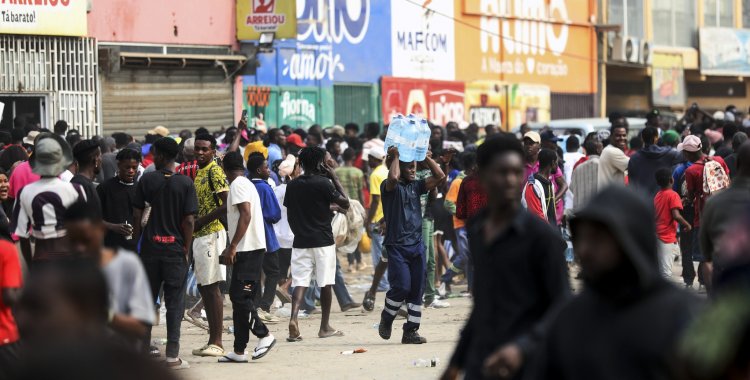The consequences of the riots, violence, and looting that occurred earlier this week in Luanda following the taxi drivers' strike are still fresh in the memories of Luanda residents, who describe them as "days of war."
The tension of recent days in Luanda contrasted with the return to normality. Since the early hours of the morning, the capital has seen the fluid flow of people and vehicles, with the familiar "blue and white" once again brightening the capital's main roads.
Bursts packed with people, gas stations, businesses, shops, and institutions operating signaled the return of citizens to work, with traces of vandalism and the presence of police in strategic areas remaining unnoticed.
The barrier of containers currently surrounding the headquarters of the MPLA (People's Movement for the Liberation of Angola), which maintains police surveillance of its committees, also did not go unnoticed.
In the town of Cacuaco, north of Luanda, the intense presence of people was highlighted by some "zungueiras" (as street vendors are known) who condemned the "days of war" experienced with the taxi drivers' strike.
"Today is calmer and more peaceful (...), these last few days were like wars and we couldn't even go out," "zungueira" Lucinda Fernando told Lusa, standing next to her mobile counter displaying jewelry and other trinkets.
For this street vendor, the taxi drivers' strike, which served to protest the increase in fuel and transport fares, was also exploited by criminals to loot and destroy public and private property.
"I believe that [this strike] didn't gain anything, because the country was at a standstill. A lot was lost, we lost, and I believe that nothing came into the state's coffers," said Lucinda, 33, who said she "made do" with the little she had in the pantry to feed her children.
With the riots in Luanda, "the country lost a lot, the stores and warehouses were destroyed, and we don't want that to happen again," said Emília António Paulino, also a street vendor, who is trying to forget the scenes of destruction she witnessed.
She praised her return to work, recalling that she experienced dramatic moments on the second day of the taxi drivers' strike, where she lost some of the goods she was selling and walked home due to lack of transportation.
"Today is going very well, on Tuesday we suffered a lot, we don't want any more war in the country, we want the country to be well (...). We lost many things, they destroyed a lot, and we want our President [of the Republic] to do something for our country," he urged.
Carlos Joaquim, 21, told Lusa – who says he was a victim of violence during the looting of the warehouse where he works in the municipality of Hoji-Ya-Henda – that he believes the vandalism in the capital will further exacerbate unemployment in the country.
Using a crutch to aid his mobility due to injuries to his left foot, which he says were caused by rocks thrown into the store where he works, Carlos lamented the scenes of looting that are compromising the country's economy.
"The country has lost more, and the unemployment rate will automatically increase, because those most directly affected were the merchants, and many stores were damaged. The hunger and unemployment rates will increase, and we only have to lose," he lamented.
Taxi drivers and "lotadores" (as young taxi passengers are known) also praised the return to normalcy, criticizing, however, the "sad episodes" of vandalism that resulted in several deaths and injuries.
"What happened was truly sad, because we taxi drivers stopped to do our job, but unfortunately, infiltrated groups appeared who don't care about good," said Osvaldo Manuel, a taxi driver for 30 years, aboard his "blue and white" at the well-known Kianda stop in the Kikolo neighborhood.
Most of the stores in this area were open, with a large concentration of street vendors and motorcycle taxi drivers. A Rapid Intervention Police team was also deployed to stop an attempted riot, as "loader" Guilherme Major put it.
Guilherme and his colleague Paulino Pedro José "thanked God" for the trouble-free start to the day, even considering that the days of riots "were complicated" and that the country had lost a lot due to acts of vandalism.
Between Monday and Wednesday, Luanda was the scene of riots and looting during the strike called by taxi drivers, resulting in more than 22 deaths, 197 injuries, and over 1,200 arrests.







